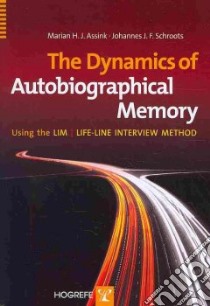- Libreria
- >
- Libri in lingua
- >
- Memory
The Dynamics of Autobiographical Memory - 9780889373709
Un libro in lingua di Assink Marian H. J. Schroots Johannes J. F. edito da Hogrefe & Huber Pub, 2010
- € 58.40
- Il prezzo è variabile in funzione del cambio della valuta d’origine
Does autobiographical memory change through the lifespan? Which events do we remember and why? Do the memories that are important differ between men and women, between younger and older people? These are just some of the fundamental questions examined in this state-of-the-art book about the course of autobiographical memory throughout life - a topic that is of increasing importance as people are living ever longer.
Based upon a 5-year longitudinal research study using the LIM ! Life-line Interview Method, in which young, middle-aged, and older men and women were interviewed three times, this book provides a completely new perspective on the dynamics of both retrospective and prospective memory. What is recalled, how it is evaluated, and the relationships between gender, age, and memory over the course of life are reported, as is the "bump effect" demonstrated using the LIM, with older adults recalling a disproportionate number of events from adolescence and early adulthood, thus contradicting classical views of life-long memory.
This volume also presents the first authorized version of Schroots' LIM! Life-line Interview Method, which asks people to draw their life-line and tell their own life-story for both past and future. Results obtained using the LIM should be interpreted, qualitatively and quantitatively, in the light of the longitudinal data presented here.
"A `must' for faculty, graduate students, and professionals engaged in the study of development and aging, and in the construction and interpretation of individual life stories and expectations for the future." James E. Birren, Andrus Gerontology Center, University of Southern California, Los Angeles, CA
"A fine example of wedding substance to method. Assink and Schroots measure and calculate, and at the same time they take care not to lose sight of what you really want to know about memories. Why do they appear so late in life? What is their emotional meaning? How do they change in the course of a human life? And most of all: How do they shape our past and future?" Douwe Draaisma, University of Groningen, The Netherlands, Author of Why Life Speeds Up as You Get Older
"An outstanding contribution to the study of autobiographical memories over the lifespan through a new and promising assessment method and an important methodological contribution to the study of aging." Rorio Femandez-Ballesteros, Autonomous University of Madrid, Spain
Informazioni bibliografiche
- Titolo del Libro in lingua: The Dynamics of Autobiographical Memory
- Lingua: English
- Autori : Assink Marian H. J. Schroots Johannes J. F.
- Editore: Hogrefe & Huber Pub
- Collana: Hogrefe & Huber Pub (Paperback)
- Data di Pubblicazione: 30 Agosto '10
- Genere: PSYCHOLOGY
- Pagine: 137
- ISBN-10: 0889373701
- EAN-13: 9780889373709


